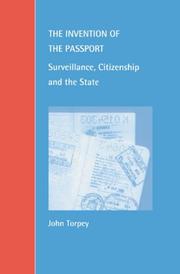| Listing 1 - 1 of 1 |
Sort by
|

ISBN: 0521632498 9780521634939 0521632498 9780521632492 9780511520990 0521634938 0511825269 0511520999 Year: 2000 Publisher: Cambridge Cambridge University press
Abstract | Keywords | Export | Availability | Bookmark
 Loading...
Loading...Choose an application
- Reference Manager
- EndNote
- RefWorks (Direct export to RefWorks)
In order to distinguish between those who may and may not enter or leave, states everywhere have developed extensive systems of identification, central to which is the passport. This innovative book argues that documents such as passports, internal passports and related mechanisms have been crucial in making distinctions between citizens and non-citizens. It examines how the concept of citizenship has been used to delineate rights and penalties regarding property, liberty, taxes and welfare. It focuses on the US and Western Europe, moving from revolutionary France to the Napoleonic era, the American Civil War, the British industrial revolution, pre-World War I Italy, the reign of Germany's Third Reich and beyond. This innovative study combines theory and empirical data in questioning how and why states have established the exclusive right to authorize and regulate the movement of people.
323.2 --- 342.71 --- 342.71 Nationaliteit. Staatsburgerschap --- Nationaliteit. Staatsburgerschap --- 323.2 Burgerbevolking in relatie tot de staat. Burger en staat --- Burgerbevolking in relatie tot de staat. Burger en staat --- Freedom of movement --- Passports --- International law --- International travel regulations --- Safe-conducts --- Movement, Freedom of --- Civil rights --- Domicile --- Emigration and immigration law --- Industrial laws and legislation --- Labor laws and legislation --- Liberty --- Personality (Law) --- Law and legislation --- Passeports --- Libre circulation des personnes --- United States --- Europe [Western ] --- Passports - United States. --- Passports - Europe, Western. --- Freedom of movement - Europe, Western. --- Social Sciences --- Sociology --- Passports - United States --- Freedom of movement - United States --- Passports - Europe, Western --- Freedom of movement - Europe, Western
| Listing 1 - 1 of 1 |
Sort by
|

 Search
Search Feedback
Feedback About UniCat
About UniCat  Help
Help News
News